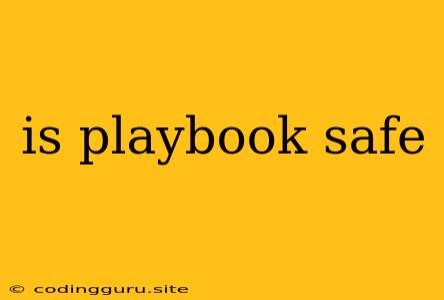Is Playbook Safe? A Comprehensive Look at Playbook Security
Playbooks are essential tools for automation and streamlining tasks in various fields, ranging from IT operations to marketing campaigns. But with the increasing dependence on automation, ensuring the safety of these playbooks becomes paramount. This article will delve into the security implications of using playbooks and explore ways to ensure your playbooks are safe and reliable.
What are Playbooks?
Playbooks are automated scripts or workflows that define a series of tasks and actions to be executed in a predetermined sequence. They are designed to automate repetitive processes and streamline workflows, enhancing efficiency and reducing human error.
Why is Playbook Security Important?
Playbook security is crucial for several reasons:
- Data Integrity: Playbooks often interact with sensitive data like user credentials, financial information, or critical infrastructure configurations. A compromised playbook can lead to data breaches, unauthorized access, and financial losses.
- Operational Disruptions: Malicious actors can manipulate playbooks to disrupt critical operations, causing downtime, service interruptions, and financial losses.
- Reputation Damage: A security breach involving playbooks can severely damage an organization's reputation, leading to loss of trust and customer confidence.
Common Playbook Security Risks:
- Unsecured Credentials: Playbooks often rely on hard-coded credentials or access tokens for accessing resources. If these credentials are exposed, attackers can easily gain unauthorized access.
- Insufficient Input Validation: Lack of proper input validation can lead to injection attacks, where attackers can insert malicious code into the playbook's input, potentially hijacking the execution flow.
- Unsecured Communication Channels: Playbooks often communicate with external systems or APIs. Unsecured communication channels can expose sensitive data to eavesdropping and man-in-the-middle attacks.
- Insecure Execution Environments: Playbooks are usually executed in environments like servers or cloud platforms. If these environments are not properly secured, attackers can gain access to the playbook's execution context and manipulate its behavior.
How to Secure Your Playbooks
- Use Strong Authentication: Implement strong authentication mechanisms for accessing and managing playbooks. Two-factor authentication (2FA) and multi-factor authentication (MFA) are highly recommended.
- Minimize Privilege Levels: Ensure that playbooks run with the least amount of privilege required to perform their tasks. This principle of least privilege minimizes the impact of a security breach.
- Secure Communication Channels: Use secure communication protocols like HTTPS for all communication channels involved in playbook execution.
- Input Validation: Implement rigorous input validation mechanisms to prevent injection attacks.
- Regular Auditing and Monitoring: Regularly audit playbooks for vulnerabilities and monitor their execution for any suspicious activity.
- Security Testing: Conduct regular security testing, including penetration testing and vulnerability assessments, to identify and address security weaknesses in your playbooks.
- Use Secure Execution Environments: Execute playbooks in secure environments like isolated containers or virtual machines.
- Implement Role-Based Access Control (RBAC): Restrict access to playbooks based on user roles and responsibilities.
- Use Secure Development Practices: Follow secure development practices like code reviews, static code analysis, and secure coding standards when creating and modifying playbooks.
Best Practices for Secure Playbook Development:
- Use a Version Control System (VCS): Track changes to your playbooks using a VCS like Git to ensure transparency and maintain a history of changes.
- Implement Automated Testing: Develop automated tests for your playbooks to ensure their functionality and security.
- Use Secure Libraries and Frameworks: Utilize secure libraries and frameworks for common tasks like encryption, authentication, and communication.
- Avoid Hard-Coding Sensitive Data: Store sensitive data like credentials and API keys in secure configuration files or dedicated vault systems.
- Implement Error Handling: Implement robust error handling mechanisms to gracefully handle unexpected situations and prevent unintended consequences.
Conclusion
Playbooks are powerful tools for automating tasks and streamlining processes, but their security is paramount. By understanding the security risks associated with playbooks and implementing best practices for secure development and operation, organizations can mitigate vulnerabilities and ensure their playbooks are safe and reliable. Remember, a secure playbook is a reliable and trustworthy tool that enhances efficiency without compromising security.
